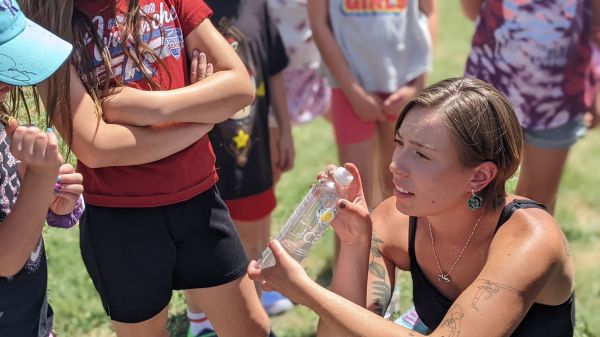Not Your Average Public School

Like many kids growing up, nature was my safe space. I studied Environmental Science and Management with a concentration in Education and Interpretation at Humboldt State University. During college, I was employed part-time by a local public elementary school and the California Department of Fish and Wildlife. I graduated early and at the top of my class. I was expecting to get a position in the field right away. However, after graduation, I became disheartened that EE was not the career path that I wanted to continue. Every opportunity I found offered low wages, part-time hours, or volunteer work. I desperately wanted to teach in the school system but could not find any way to do so. Despite loving the environment, I still needed to make a living. Then, I found my current home at Westgate Community School (WCS).
Today I am here to talk about my work at Westgate and explain why we must integrate environmental education into our public school systems.
WCS is a K–12 charter school, but unlike any other. WCS serves all students and specializes in gifted and talented education. All students benefit from gifted educational practices. WCS empowers students to be authentic, supporting academic goals—and most importantly to my job—developing stewardship for the environment. If you were to walk onto campus, you would see older students leading younger students and even classes learning outside. You would see students interacting with; gardens, goats, barn cats, chickens, and beehives. You might catch a student on a nature walk, taking a break from class with adult supervision. You might see students heading out on a field trip to learn more about their service learning topic.
Environmental Education is just one of the many pieces of Whole Child Education at Westgate. Our students participate in weekly Environmental Education programs with my leadership and support. I pull from resources aligned with Next Generation Science Standards (NGSS), such as Project Learning Tree, Project WET, and Project WILD. Students also learn through hands-on lessons how to care for Westgate’s farm animals. We have barn cats, chickens, goats, bees, gardens, and even a snake on campus. Families can be a part of the Chicken Tenders program, where they volunteer to take care of the animals during the morning or evening. These hands-on experiences in and out of the classroom create confidence for students interacting with animals and depth in understanding the environment. Some students even say that our animals understand them better than humans do.
In addition to Environmental Education, students participate in Service Learning, where each grade level provides service throughout the school year. Students learn that providing service is multi-tiered and does not have to be tangible. So, we can start small—serving ourselves and grow into serving; others, their communities, the environment, and even the world. They learn that raising awareness is a service too. Many students look forward to service learning every week. All students have the chance to shine in a way that is not just academic. This year, service learning topics include; hatching butterflies, supporting animal shelters, hatching chickens, tending to our animals, spreading kindness, bee education, supporting veterans, recycling, and gardening.
Different grade levels go on different Environmental Education and Service Learning field trips to support their service-learning topics. For example, this year's Kindergarten class is hatching butterflies and making butterfly gardens for their service learning. To support their learning, we went to the Butterfly Pavilion to learn more about the life cycle of these creatures. Another example is the 9th graders who oversee taking out the recycling around our campus and is working on other small projects related to recycling. Their field trip this year is to the Boulder Recycle Center.
Compared to other public schools I have worked at, the students at WCS seem more confident around animals and know so much about the world (sometimes more than me). Environmental literacy is high on this campus. My wish for the future is that every public school has someone in a position like mine, someone leading Environmental Education and Service Learning on campus. Without this in every public school, our future could be negatively impacted. I am thankful for Westgate students, staff, and teachers who fully support Environmental Education. It is refreshing to see the year-round (and full-time) enthusiasm for a subject that is usually pushed aside and left for summer camps or field trips. My advice to any recent graduates in the EE field: Keep applying for those positions! We must integrate this important subject into our public school systems and keep Environmental Educators employed.

